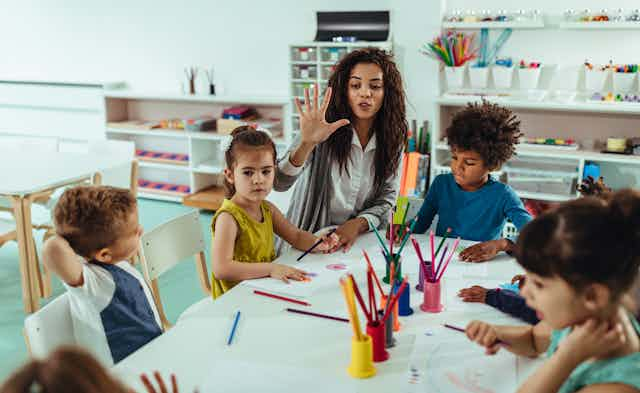School closures were one of the control measures used to stem the transmission of COVID in the UK. We wanted to find out what impact school closures had on the education, health and wellbeing of pupils and school staff and the challenges that emerged when schools reopened.
To do so, we conducted a survey of over 200 teachers and other school staff working in primary schools in Wales.
We looked at the effect of school closures from their perspective – and found out what they thought schools should focus on as they returned to face-to-face teaching.
Prioritising wellbeing
School staff pointed to the range of negative effects of school closures on children’s physical and mental health.
A reception year teacher told us that pupils returning to the classroom had a “lack of physical fitness”, while a headteacher said that assessments carried out in the school showed “a decline in emotional well-being”. Two-thirds of the staff we surveyed selected “supporting pupil health and wellbeing” as a priority for future teacher professional development and training.
Teachers and teaching assistants suggested that schools should have designated staff to help with promoting wellbeing, and that more school-based activities should be planned around children’s wellbeing. This would include dedicating more time for outdoor learning and increasing opportunities for play.
A new curriculum for Wales comes into effect from September 2022, with health and wellbeing one of the six headline curriculum areas. This new statutory focus on health and wellbeing will help teachers and schools devote more attention to pupils’ physical and mental health through learning experiences and wider school activities.
Staff also felt that there was too much focus on assessment: children in Wales complete national reading and numeracy tests annually from year two (ages six to seven). A teaching assistant thought that there should be “less pressure about assessments and attainments and more focus on the children and their needs and feelings”.
This extended to the assessment of schools. A deputy headteacher called for less emphasis on school results and the comparison of results between schools.

Several school staff raised concerns that their own wellbeing had been ignored. They pointed to a lack of work-life balance and the pressure they had been under to provide the same level of work as before the pandemic while also supporting their own families from home. Teacher wellbeing is a critical factor in creating stable environments for children to thrive.
School closures required remote learning and teaching from home. This has resulted in wide variations in learning progression and gaps according to how much support parents were able to provide. Challenges for parents included working commitments and particular barriers for children with additional learning needs.
The school staff suggested that phone helplines could be set up to offer parents help with home learning. Staff wanted to build on some of the positive results of home learning, such as strengthened links between home and school.
Direct support
During the reopening of schools where attendance was capped, school staff noted the benefits of smaller classes and more direct support provided to pupils. One teacher said:
Smaller classes have provided more quality “chats” with teacher which has benefitted the children’s wellbeing and been particularly helpful in reducing levels of anxiety. The more relaxed structure has had positive effects on staff and pupil wellbeing on the whole.
School staff in our study recognised that providing this would require extra staff and significant funding and investment from government. While recent educational investments have been made in Wales, with a focus on recruiting more staff, it remains unclear if these investments will support sustainable smaller class sizes.
During the pandemic, many children have struggled with a lack of access to computers and other digital learning aids. This is keenly felt in Wales, and staff in our study pointed to problems such as competing demands for equipment.
A deputy headteacher suggested that the gap between pupils who had access to devices and the knowledge of how to use them had widened, and that some pupils had been held back if their parents did not have a good knowledge of technology.
Staff in our survey called for more digital equipment and training. Perhaps this will lead to a renewed focus on ensuring the necessary training and infrastructure is in place for future pupils, families and teachers.

